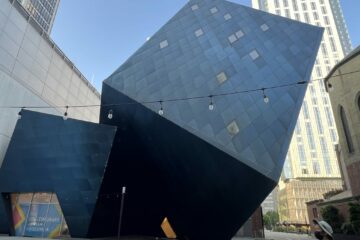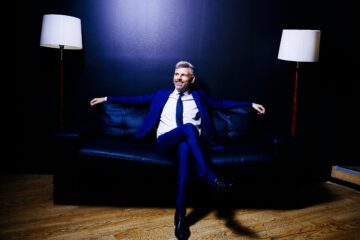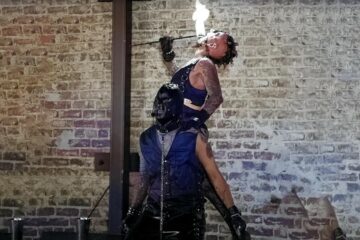Growing Up, & Out of San Francisco
Guest Post by Michael J. Shymanski
In 1994, I was three and owned one cassette tape that I had stolen from my father. I did not know where the sound came from in the car nor what a “dookie” was, but Green Day’s “Welcome to Paradise” stayed in the no.1 slot on my top 100 for the rest of that decade. I started forming first memories, piecing together the Sunset Avenues, the drive down Sloat Boulevard to swim lessons, the return to the city up the 101. That album was always in the car; my dad and I were always listening. I remember sitting in my booster, car still in the driveway, waiting for the ignition, the punch of guitar, and the roll into the concise grid of the Outside Lands neighborhoods. It may have seemed like just a song and just a city, but the soundtrack and the setting would become more than just the backdrop between my father and me.
In the nineties, my dad had a job in downtown SF. I saw him put on fancy duds and figured he made it happen in the skyline. Things were great, but in my youthful ignorance I perceived that these things were just the things, the routine, the way they were, it was all I knew. There was school, swim lessons on Saturday, Mass on Sunday, and the soundtrack, a few new entries in the canon but still very much “Welcome to Paradise” in San Francisco. At the turn of the millennium, my dad lost his job. I thought it was anger in his voice, but I was too naive to know indignation and the timbre of inadequacy. I did not know it at the time nor the impact upon us because we were in the Sunset, under that shield of gray fog.
Some things changed. We went on fewer trips. We ate the same foods, pretty much on a weekly basis. My mom took a job at the university, incredibly overqualified, undoubtedly underpaid. But I was young. Those things became the new things, that is to say, I was young enough to adopt a new routine. When I grew into myself, I found—more to my chagrin than pleasure—that I was growing into my father. We have the same spindly limbs up to the same height. We have the same casual blue eyes, the color of denim. We are not particularly handsome, but if you look at us long enough, you might find something of value. More striking is our similar histories, none ersatz to the other. We ran the hurdles, and were only good our senior years. Our resumes held many jobs through college and our early twenties, construction and bussing being a couple. We liked the same music, though my taste can be attributed to his syllabi of many car rides. Moreover, my father and I were also loved and burned by the same city, fifteen years apart.
San Francisco loved me and let me go, starting in 2011 when I was looking for apartments. My mother, still at the university, got me tuition remission, a fat discount so I could attend a four-year college. I should have been living at home, but I wanted the “college experience” and took out loans to live off-campus. That year I paid $750 a month for a small room with six guys. The next year I paid $1000 a month to live with three other roommates, lifeguarding extra hours and giving swim lessons to pay a chunk of the rent. And the year after—my last at school—I refused to look at the listings, packed up, and moved back home. Here we were trying to save money, to get me an education, to have fun, all in what was escalating to be the most expensive city in the states.
“Techie” was the word going around, a pejorative used when people didn’t tip well or when rents were exploding or when people needed someone to blame. Bussing tables I could hear ideas for apps, who’s buying who, net worth, smartphone, Uber, Lyft, Sidecar, data, stock and shares, Tinder, unicorn companies, bubble, money, money, money. It was Start-Up culture; it was Tech Boom 2.0 and the city was thriving. From Twin Peaks, the skeleton arms of cranes were altering the skyline. I watched buildings grow bones and muscles and flesh, filling the edges of the peninsula to the brim. These newer skyscrapers with their brilliant glass facades overshadowed the offices where my father once greased the cogs. During the day, the wedge of Market Street lay like an old scar earned from the Dot-com Boom and Crash. At night, it shone like a runway, the constellations unfamiliar to those who thought they knew the sky.
There is an episode of The Simpsons where the Moe’s Tavern, the local dive, revamps itself into something hipper, trendier, and more successful. Homer Simpson and his squad are excluded and the bar—now Meaux’s—moves on without them. A city can feel that way; the watering hole where I’ve been for almost twenty-five years and my dad for thirty-five seems too good for us now. It’s a club that no longer permits regulars no matter how many times you’ve rubbed elbows with the varnish.
But my dad does not go to bars. I do—probably compensating for him—and in my mid-twenties the differences between us are easily palpable. Where his hair darkened, mine stayed light and I grew it to my shoulders. His look is clean and classic; my ears are pierced. He speaks French; I speak Spanish. We have Master’s degrees: his in business from the east coast; mine in education from the west. He lives in San Francisco; I do not. I have a new routine, a new playlist, and a new skyline to drink to. “Welcome to Paradise” comes up on shuffle rarely from the thickets of my music library. To look back at San Francisco is to see my father and a long history. I never knew the Dot-com Boom, but in understanding its progeny, I can see the traits, genetics, and make a mold of its predecessor. In understanding my struggles, I understand my father. He still lives in the Sunset, in that baby blue house. He sings in a band, oldies mostly—Rolling Stones, The Faces, etc.—and stores the tracks on a computer. In that house on Quintara, beside atavistic CD’s and antiquated records is my Green Day tape: two miniature spools of magnetically coated polyester-type film, my jam on the fifth track A-side, and the access to father and son in the Sunset Avenues.
Cover picture by Toby Silverman












